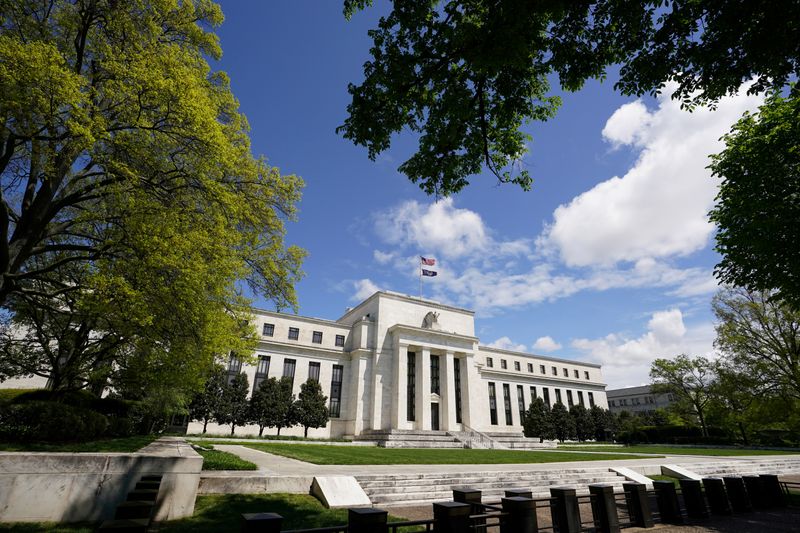By Pete Schroeder and David Henry
WASHINGTON/NEW YORK (Reuters) - The U.S. Federal Reserve announced on Thursday it will cap big bank dividend payments and bar share repurchases until at least the fourth quarter after finding lenders faced significant capital losses when tested against an economic slump caused by the coronavirus pandemic.
In its analysis, the Fed found that the country's largest lenders have struggled to model the unprecedented downturn and ensuing rescue programs, adding to already unprecedented uncertainty about how banks and the economy overall would perform in the coming months.
The Fed did not say how each bank fared under the pandemic analysis, but found the 34 tested firms could suffer as much as $700 billion in aggregate loan losses under the most severe, "W-shaped" economic recovery.
Shares of banks including JPMorgan Chase & Co (N:JPM), Bank of America Corp (N:BAC), Citigroup Inc (N:C), Wells Fargo & Co (N:WFC) and Goldman Sachs Group Inc (N:GS) tumbled in after-hours trading on the news, having risen earlier in the day.
The Fed determined that although banks could weather a severe, tumultuous and prolonged economic downturn, several would cut close to their minimum capital requirements.
With that in mind, the regulator placed a new limit on how much capital banks could pay to investors in dividends in the third quarter. They cannot pay more than they did in the second quarter, and payments cannot exceed average net income over the last four quarters.
The Fed also said it was barring share repurchases for at least the third quarter. The biggest banks had voluntarily suspended buybacks as the pandemic took hold, but it was not clear how long that would last.
The Fed's actions were unprecedented. It was the first time since the central bank implemented stress tests during the 2007-2009 financial crisis that it had to fundamentally alter its annual exam for a dramatic economic swing.
After releasing some details in February, the Fed had to add last-minute "sensitivity analyses" in May to account for actual economic turmoil that exceeded the worst-case officials envisioned in the original test.
The Fed's analysis suggested that some banks are more vulnerable than others. In aggregate, banks saw capital levels fall to 7.7% under the toughest scenario, but some came dangerously close to the 4.5% minimum they are required to hold to be considered well-capitalized.
Without naming any particular bank, the Fed said some relied on "more optimistic than appropriate" outlooks and that their capital planning "has not been thoughtful."
The biggest banks either declined to comment or did not immediately respond to Reuters on Thursday evening.
The Financial Services Forum, an industry trade group, said the results underscored the industry's strength. The group also highlighted steps banks have taken to support the economy and urged the Fed to be transparent in its process.
Banks privately received their specific results from the Fed on Thursday. They can adjust original plans to get a better assessment, and release those details after the market closes on Monday.
Analysts and investors suggested the Fed's capital limitations - though surprising - were not necessarily a bad thing. Although banks had voluntarily suspended buybacks, they were more reticent to limit dividends, and the Fed's restrictions are forcing them to be cautious.

"It is worth being punished a little bit to ensure the long-term viability of your investments," said Bill Smead, chief investment officer of Smead Capital Management, whose fund owns JPMorgan, Bank of America and Wells Fargo. "I'm not mad at (the Fed)."